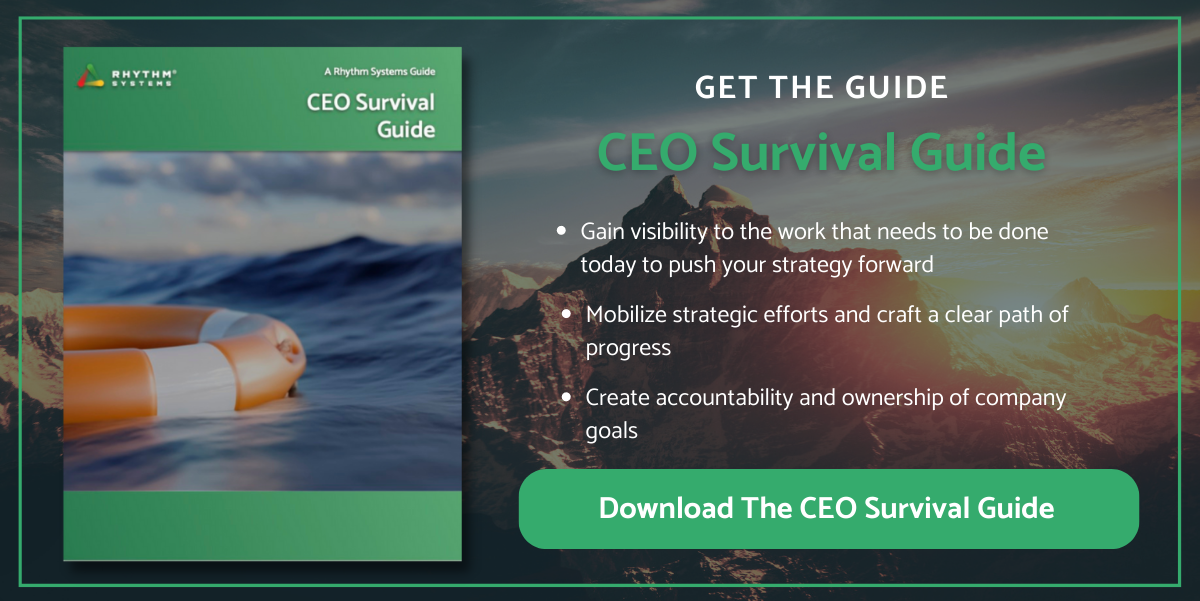“Time is an inelastic resource. No matter how high the demand, we cannot rent, hire, or buy more of it.”
-Peter Drucker
A Quick Note: This is a lengthy blog, but if you read it you’ll already be spending your time in an area where you should be spending your time (as you’ll see toward the end). So sit back, give yourself the gift of time, and enjoy the read.
A primary focus of my job is to help middle-market CEOs and their Executive Officers increase their efficiency while also (and more importantly) increasing their effectiveness. Most CEOs I work with tend to agree that there’s never enough time in a day to do everything that needs to be done. As their companies grow and hit various ceilings of complexity, CEOs find that they, too, hit their ceilings of complexity. This realization is all-consuming and inundating, with the result being a string of behaviors that play out to result in focusing on what’s in front of them—on what they perceive deserves their time and attention at that moment in time (and many times, this intense focus also leads to long—very long—work hours). Interestingly, Harvard Business Review researchers found that the most effective leaders aren't the ones who constantly work a ton of hours each week, but rather the ones who are the most attentive and focused while at work. Most CEOs intend to be attentive and focused, yet the hunger to simply work long hours so they can do more can be a massive beast that slowly devours the most valuable resource CEOs have: Time.
As an Executive Coach, it’s my job to expedite the impact of executive officers by helping them discover how their time should be spent to maximize their time and increase their influence with the leadership team. With most of my coachees, it’s the Golden Question, “How should I be spending my time as a CEO?” The Golden Answer requires a shift in how CEOs think. Without a shift in thinking there will be little to no meaningful, higher-level shift in the executive’s daily routine.
A Prerequisite for Knowing Where to Spend Your Time
Tradition breeds the way we think. Therefore, a prerequisite to knowing where to spend your time requires first challenging your assumptions about the role itself. For instance, it’s assumed by many that working long hours is simply a CEO's lot in life. It’s just what CEOs do (so you end up pushing yourself to work longer hours). Yet, there is a huge body of research that tells us that working longer hours does not equal higher levels of productivity. Longer hours also don’t equate to effectiveness, either. (Argue as you will, but the research is quite conclusive.) To be an effective CEO requires you to walk away from this and other false perceptions of what constitutes success for a CEO. The prerequisite, then, is for you to challenge your assumptions about what it means to be a CEO.
Parkinson's Law, first published in The Economist in 1955, states that "work is elastic in its time." This means that if you set aside one hour to write a report, it'll take you the full hour. If you set aside 15 minutes, it will take 15 minutes.
Look to stop working harder. Instead, think about how you can work differently. You’ll never be able to frame your time to the very minute because “life happens.” But you can gain a lot more control if you know what you should try to be attentive to and focused on as a rule. Just realize, too, that there’s a yin-yang to this whole endeavor of spending your time wisely in that it takes a ton of flexibility and discipline. As noted by Elena Botelhos, founder of the leadership research firm CEO Genome Project, “Often, when CEOs conduct calendar reviews and look at how their time is spent, they’re surprised to find that top priorities are regularly trumped by urgent fires.”
So be flexible, but also employ the discipline needed to be focused and attentive to what matters for you to be an effective leader of a growing company.
How Should CEOs Spend Their Time?
Here are a few thoughts for your consideration as you strive to answer the question of how you should be spending your time. As I noted upfront, this is a longer read than a typical blog post, so simply sit back and allow the following points to stir your thinking.
Remember:
(a) How a CEO chooses to spend his/her time can depend on a multitude of variables, such as where the company is in its growth trajectory, the industry, how big an internal or external challenge is at the current moment in time, etc. The bottom line, though, is that there are core elements every CEO should work toward so that s/he can steer a growth company in the right direction. In other words, CEOs should focus on running their companies so that their companies don’t run them. They should use their executive assistants effectively to manage their time.
(b) Secondly, remember that the percentages below are approximate. At certain times, you’ll spend more time on the strategic components (such as developing your 3 Year Strategic Plan and managing cash flow) or you’ll spend more time analyzing a gap and being a solution resource for a situation of primary importance, etc. The point is to strive for the approximations below to maximize your time for efficiency and effectiveness with your executive coaching engagement.
CEOs Should Spend 40% of Their Work Time on the Future

As examples:
Lead to a Clarified Vision. Vision casting isn’t every CEO's favorite thing to do. With that said, though, challenge your assumptions about what spending time on the future means. It doesn’t mean you must be ‘good’ at visioning or dreaming about the blue business sky of tomorrow. It means that you must spend your time leading people toward the future. You can’t do this effectively without a good BHAG (Big Hairy Audacious Goal) and/or without a definition of where you want the company to be three to five years from now. Where you want to be (and perhaps what you want the company to be known for) defines where you spend your time today.
Spend time creating opportunities by being ‘outward’ vs. ‘inward.’ An interesting analogy presents the CEO as the captain of the Titanic. The captain of the Titanic had talented and capable engineers in the engine room, great shows and entertainment onboard the ship, incredible chefs who delivered the best cuisine, and a wonderfully focused crew to take care of the ship’s guests. At the time, too, he had what was lauded as the most awesome ship in the world. With all these advantages, though, the captain still didn’t see the iceberg. So the ensuing question from this analogy is, “Should a CEO be looking inward or outward?”
Spend your time keeping your company’s financial reservoir fueled by looking outward. By looking outward, you help focus your company’s future by being the creator of opportunities. In tandem, set the expectation for your executive team to teach their people how they’ll need to think about the future. For instance, salespeople may need to update their approach from a typical sales approach to more of a consultative one because your defined future may require them to become less transactional to engage more fully with core customer value. You can’t ignore internal operations but spend the bulk of your time on the external components that will fuel your company’s growth tank (i.e., building opportunities for the injection of new revenue) vs. spending time with an internal focus.
Think of being ‘outward’ this way: Productivity serves to keep things moving internally (and it’s important), but productivity alone probably won’t make you #1 or #2 within a given market. Hire strong leaders to lead internal operations and maximize efficiencies and product/service delivery. You should only spend time internally if there are major issues (which might tell you that some adjustments around people and/or expectations need to be made). A key point here is that rarely are great companies built by the singular activity of sitting at a desk.
Create your future org chart. Draft it out. Don’t use names; just stick to titles that are recognizable to you such as CFO, EVP of Talent, CFO, Controller, etc. (You can change titles to something better later if desired; for now, though, just stick to titles that are a rote description of the positions.) As time passes, review your future chart. Revise it. Refine it. Work with it. Spend face-to-face time with the future leadership of your organization and learn their strengths and weaknesses.
Which areas are already filled with the right person? Which areas might someone grow into, and what might you do to encourage that person to grow so s/he is prepared for the new role when the company’s ready for it? Where is there a spot that’s currently filled, but the person just isn’t in the right seat? What might you do about that in the near term so that you’re better prepared to meet the future? Which spots don’t exist today but will need to be filled later? Prioritize those. Purposefully map the human side of your company’s future.
New CEOS will want to read our specialized article with 11 tips to get started as a new CEO.
CEOs Should Spend 30% of Their Time on Strategy

As strategy execution examples:
Spend time being strategic. With your executive team, jointly create three to five year goals (i.e., In three to five years, what do we want to be known for? What do we want to have accomplished by a point in time?). With this defined, be the rock on your team that gives time to set expectations around what the team will do this coming year as the first step toward your three to five year vision. What’s your Annual Plan? From this point, what’s your Quarterly Plan for the next quarter? Button everything up by identifying who’s accountable for what and by clearly defining what success looks like. Allow your leaders to take ownership.
Once your strategic roadmap is created, you can define where you should spend your time, internally and externally: Based on your strategic roadmap, should you spend time with key stakeholders? With essential supply chain partners? With your potential customer base? With current core customers who might grow their accounts with you? What is your CEO KPI dashboard telling you?
Create Accountability and a Culture of Transparency. Raise the bar on transparency while also raising the bar on personal accountability. This is probably the greatest advantage of a tool such as the Rhythm Dashboard. Each quarter is a 13-Week Race to accomplish a set of Quarterly Priorities that will take your company to where you want to be by year-end. Each week, your team members should each status the Quarterly Priorities they own so you can be more proactive than reactive by solving real-time problems, issues, and challenges during your Weekly Team Meetings. This type of transparency also builds a higher level of personal accountability throughout your organization. Work very hard to build accountable leaders and teams.
Use your Weekly Meetings to streamline problem-solving. CEOs should gravitate toward concepts of ‘leadership’ vs. ‘management.’ Stop training the leaders that surround you to come to you to solve every single problem. You should steer these leaders to solve their own problems. Asking for your thoughts or expertise is fine, but this shouldn’t take hours and hours of your time, nor should you be pulled into every single meeting. As long as you let yourself be the #1 problem solver, people will come to you again and again to solve problems they should be effectively solving on their own.
Similarly, as long you think your presence is needed in almost every meeting, then progress will be stifled (because if you're unable to be present, no one will make any decisions because they’ll be waiting on you). Work to be a resource, but don’t work to be the one and only solution provider. If you have effective Weekly Meetings, then problems worthy of time should be discussed there. To borrow a concept from Apple, your executive team is your Genius Bar, so use the collective intelligence of your team as a resource to foster joint problem-solving on the issues that matter. Use your weekly team meetings as the platform for these discussions vs. one-on-one sit-down meetings that waste your time.
CEOs Should Spend 15% of Their Time Analyzing Key Success Factors

As examples:
Pay attention to your company culture. You can measure the degree to which your company is highly performing (or not). So look to set the stage for a great culture and then measure your progress. Solidifying your culture means you’ll have less to worry about as you move toward spending more of your time outside your company. Your company culture can be a catalytic mechanism for you. I work with clients to measure the degree to which they have a high-performance culture (or not) by doing a general Culture Survey or by doing Leadership 360 Surveys on a group of key leaders. Doing this is essential because you’re given raw data. Your team of leaders can argue all day long about how people perceive your company culture to be, but no one can argue with the data. So put perception (and often wishful thinking) aside and measure your company’s culture. Only then can you be strategic about knowing what to do to build an even higher level of overall performance.
Your culture is a catalytic mechanism simply because competitors have a very hard time copying a culture. They can copy a product, a service, a gizmo, or whatever. But there are plenty of business examples that demonstrate how very hard it is to copy a viable, high-performance company culture.
Use the power of your presence. On a more personal note, also recognize that there’s a great deal of power in your presence as a CEO. Most CEOs I work with don’t ask for this but it’s a truth nonetheless. Your mere presence, your words, your actions, your smile, your demeanor—all of these serve to inspire those around you toward higher levels of performance…or not. Focus on nurturing the talent you have while building a strong productive culture. Paula Marshall Chapman, CEO of Bama, calendars in ‘walking the shop floor’ because she sees the strategic value of connecting with the people within her company.
Bottom line: When you’re in the office, work to get out of your office. Walk around; connect; talk; share; and smile. Be a resource for your leaders; be accessible. Hold your executive leaders to higher standards and accountabilities around these same endeavors.
Analyze any gaps (current or potential) that you see. Based on your company’s strategic intent, what’s working well, and why? What’s not working, and why? What’s a potential roadmap for filling the gaps? What resources (which includes your people) are needed to expedite a solution? Where does there seem to be a lack of clarity around expectations? What key internal functions need to operate at a higher level so that margins are increased? What results do you need to see that you aren’t seeing? At what revenue inflection points will we need to hire new people (and in what positions)?
Focus on your people. Who is an underperformer that you need to have a talk with about expectations? Use this time to frame that conversation (and then have the conversation). Who needs your expertise, and how can you share that expertise? Part of this blends with “Creating your future org chart” from area #1 presented earlier in this blog.
Take a Deep Dive. Another suggestion for using this 15% of your time is to take a deeper dive into understanding a core issue or challenge your company is having. By pausing to reflect and think, you give yourself the space to think more clearly. A new set of questions will emerge as you study and research a given area, as you allow yourself to ponder and entertain alternative ideas, and you’ll be extending your knowledge as well. If you don’t give yourself the time to pause and reflect, you’ll be forever caught up in the rat race. As the comedian Lily Tomlin once said, “The trouble with the rat race is that in the end, you’re still a rat.” So get out of the rat race and permit yourself to take the time and space to think…something…through.
CEOs Should Spend 15% of Their Time on Strategic Leadership Mindset
(i.e., self-reflection, self-edification, mindfulness, planning, and thinking)

NOTE: If there’s time left from one of the above, it goes here.
For instance:
Stay smart. In short, read. Read blogs, read books, read articles. I had dinner with Daniel Pink a few years ago, and he noted that he purposefully reads magazines that are outside his given profession (such as Oprah) because he will read something that suddenly sparks his thinking about how to see a business challenge differently, or a tidbit will jolt his thinking on a key concept, etc. Warren Buffet believes that consistent reading is how knowledge builds upon itself, much like compound interest. Elon Musk is adamant about reading. Bill Gates, known for his firm belief that CEOs should have a regular rhythm for reading, affirms the notion of getting comfortable with whatever you’re reading: Write in the margins, draw arrows and stars, and turn down the corners of pages.
According to Tom Corley, author of Change Your Habits, Change Your Life, 88% of financially successful people read at least 30 minutes a day. If you select a book, just chip away at it by reading ‘x’ number of pages a day. Don’t know which book to start with? Try Corley’s book noted above or The Wisdom of Crowds by James Surowiecki, or A Whole New Mind by Daniel Pink, or Essentialism: The Disciplined Pursuit of Less by Greg McKeown, or Orbiting the Giant Hairball by Gordon MacKenzie, or Leaders Eat Last by Simon Sinek, or Rhythm: How to Achieve Breakthrough Execution and Accelerate Growth by Patrick Thean, or Predictable Results: How Successful Companies Tackle Growth Challenges and Win (co-authored by myself and my fellow consultants at Rhythm Systems). If you need more, just let me know…
Don’t work on airplanes. Give yourself a break by not working on airplanes, treat it as "you" time, not work time. Instead, use the time to relax, read a magazine, thumb through a book, play video games, or watch a movie. In short: Chill! Phil Libin, the former CEO of Evernote, put it this way when interviewed by The Washington Post: “Like everyone else, I used to just work on airplanes—I'd use that as a time to catch up on things. And [then] I stopped. I said when I'm on a plane, I won't work. I'll read, I'll play video games, I'll sleep, I'll watch movies, but I don't work. It makes me look forward to flying. I can get off a long flight, and be kind of relaxed." If you're a mid-market CEO you probably don't take all of your vacation days, so use this time to relax and unwind. The average CEO works 9.7 hours per weekday and at least one weekend day.
Get an Executive Coach. In a study by the International Coaching Federation, in consultation with PricewaterhouseCoopers LLP and the Association Resource Centre, Inc., the mean ROI of executive coaching was 7 times the initial investment, and over a quarter of coaching clients reported a stunning ROI of 10 to 49 times the cost. There’s a domino effect when you expedite your decision-making or when you improve your business sense and expertise as a leader. Learning how to lead differently catapults your ability to influence more productive behaviors of those around you.
The focus of Executive Coaching is on you as an individual in a business context. The emphasis is placed on increasing your effectiveness, thereby producing meaningful action. An Executive Coach will simply get you where you want to be quicker. A strong Executive Coach is good at truth-telling, (i.e., I remind my clients that as an Executive Coach, it’s my job to tell them what others might not want to tell them). As one CEO coachee recently said to me (after a bit of a pause), “You’re direct,” …another pause… “I really like that.” I smiled and said to him, “Glad you appreciate that because…it’s my job.”
An Executive Coach serves to help you gain clarity in your thinking, helps you wade through all the options you might have for dealing with a specific situation, serves to provide alternative perspectives around all the multiple components of growing a company, and helps you lead yourself toward your preferred future (so you’ll be spending your time as you should), jump-starts your thinking, and holds you accountable to your own Leadership Path of Progress.
The CEO Golden Formula, then, is “40-30-15-15”
Getting to 40-30-15-15 takes a while; you can’t just flip a switch and be there. But you can start working toward maximizing your time so you aren’t working horrendous hours because you’re spending your time in worthless meetings or because you’re involved in too many internal operations. The company is more than just you and needs to operate that way. Start your journey today toward gaining control of your company while also reclaiming a bit of your focus of control (and sanity). Think about how you have spent your time over the previous 90 days. How close were you to the golden formula? How much more effective could you have been if you had used this CEO time management framework?
Smart leaders don’t lead alone. If you simply desire to expedite your leadership efforts or if you struggle with figuring out what to do first, contact my team to learn more about executive coaching. For 25 years, my passion has been around helping executives (a) create (and then clarify) their organization’s strategic priorities for growth, (b) gain clarity around building high-performing cultures (as linked to bottom-line performance), and (c) multiply their impact via Executive Coaching. It’s my pleasure to be a resource for your continued success.
Photo Credits: iStock by Getty Images
If you enjoyed this post, here are some others you may like:
How CEOs Grow Accountable Leaders & Teams [Video]
A Leader's Template: 6 Questions to Ask in Your Next One-on-One Meeting
5 Insights You'll Learn from Executive Coaching
Key Performance Indicators for Employees
The Five C's of Team Accountability
Strategic vs. Tactical Leaders: Which Are You? [Video]
11 Books Every CEO Should Read




